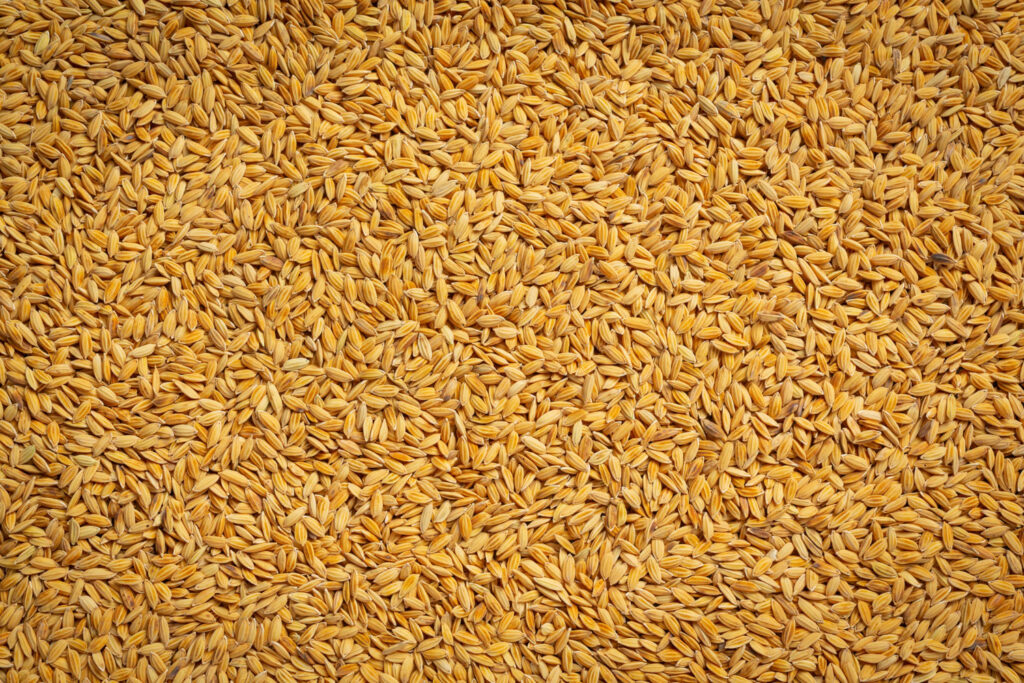
What are Carom Seeds?
Carom seeds, also known as ajwain, are small seeds obtained from the Trachyspermum ammi plant. They’re widely used in Indian cooking for their distinct flavor and aroma. These seeds are valued not only for their culinary uses but also for their medicinal properties, particularly for aiding digestion and relieving stomach discomfort like bloating and indigestion. They’re often included in spice blends or used as a seasoning in various dishes to enhance their taste and promote digestive health.
What are 10 Surprising Benefits of Carom Seeds?
Digestive Aid: Carom seeds help improve digestion by stimulating the release of digestive enzymes.
Example: Chewing a small amount of carom seeds after meals can prevent bloating and indigestion.
Anti-inflammatory Properties: They contain compounds that help reduce inflammation in the body, easing discomfort.
Example: Applying ajwain oil topically can alleviate arthritis pain and muscle inflammation.
Relief from Respiratory Issues: Carom seeds help relieve respiratory issues like cough and congestion by acting as an expectorant.
Example: Boiling carom seeds in water and inhaling the steam can provide relief from chest congestion.
Boosts Immunity: The antioxidants in carom seeds strengthen the immune system and protect against infections.
Example: Consuming dishes seasoned with ajwain regularly can help prevent colds and flu.
Relief from Menstrual Cramps: Ajwain has analgesic properties that can alleviate menstrual cramps.
Example: Drinking ajwain tea during menstruation can help reduce pain and discomfort.
Improves Cholesterol Levels: Carom seeds help lower bad cholesterol (LDL) levels in the blood, reducing the risk of heart disease.
Example: Consuming ajwain regularly can contribute to maintaining healthy cholesterol levels and promoting heart health.
Antibacterial Properties: They possess antibacterial properties that can help fight against various bacterial infections.
Example: consuming ajwain-infused water can aid in treating bacterial infections in the digestive system, promoting gut health.
Reduces Acidity: Ajwain water can help in reducing acidity levels in the stomach, providing relief from heartburn.
Example: consuming a mixture of ajwain powder and water can alleviate acid reflux symptoms.
Improves Oral Health: Gargling with ajwain-infused water may help in maintaining oral hygiene and reducing bad breath.
Example: gargling with ajwain-infused water can soothe a sore throat and fight bacteria in the mouth.
Eases Joint Pain: Applying a paste of carom seeds can reduce inflammation and relieve joint pain.
Example: Massaging the affected joints with ajwain oil can provide relief from arthritis pain.
Carom Seeds: Why are they?
Carom seeds come from a plant called Ajwain, mostly found in India and the Mediterranean. These seeds are tiny but packed with good stuff like thymol, terpinene, and carvacrol. They’re like little health boosters! One big thing they do is help with digestion. Thymol helps your stomach make juices that break down food, so you feel less bloated and gassy. They also calm down your stomach if it’s too acidic, giving relief from heartburn. Plus, they can help with breathing problems like asthma because they fight inflammation. Some studies even say they might help you lose weight by speeding up your metabolism and making you feel less hungry. And if that’s not enough, they can also fight off bad bacteria and reduce inflammation in your body. You can easily add them to your cooking or make tea with them, but remember, it’s best to talk to a doctor before using them a lot, especially if you have health issues.
Healing Health Perks Of Ajwain
- Combats Infection: Ajwain contains compounds like thymol that have antimicrobial properties. These compounds help fight off infections caused by bacteria, fungi, and viruses.
- Promotes Digestion: The active enzymes in ajwain seeds aid in digestion by boosting the secretion of gastric juices. This helps in breaking down food more effectively and relieving digestive discomforts like bloating and gas.
- Regulates Blood Pressure: Ajwain seeds contain certain minerals that help in maintaining blood pressure levels within a healthy range. This can be beneficial for individuals with hypertension.
- Treats Common Cold And Cough: The expectorant properties of ajwain help in loosening mucus and relieving congestion in the respiratory tract, making it effective in treating symptoms of common cold and cough.
- Ajwain Water: Ajwain water is a simple home remedy where ajwain seeds are soaked in water overnight and consumed the next morning. This concoction is known to aid digestion, boost metabolism, and detoxify the body.
- Relieves Arthritis: The anti-inflammatory properties of ajwain can help in reducing inflammation and pain associated with arthritis. Consuming ajwain regularly may provide relief to individuals suffering from arthritis.
- Enhances Skin Health: Ajwain is rich in antioxidants that help in combating free radicals and preventing skin damage. Including ajwain in your diet or applying it topically can promote healthier and glowing skin.
- Arrests Premature Greying of Hair: Ajwain is believed to have properties that can help in preventing premature greying of hair. Massaging ajwain oil onto the scalp or consuming ajwain seeds may contribute to maintaining the natural color of hair.
- Ajwain Water for Weight Loss: Ajwain water is often consumed as a weight loss aid due to its ability to boost metabolism and aid digestion. It is believed to help in burning fat more efficiently and promoting weight loss when combined with a healthy diet and regular exercise.
- Omam Water uses: Omam water, another name for ajwain water, is popularly consumed in South India for its digestive properties. It is also used in traditional medicine to alleviate various ailments including indigestion, bloating, and acidity.
Are There Any Precautions To Take When Using Ajwain?
- Allergies: Watch out for allergic reactions, especially if you have known allergies to spices or seeds.
- Pregnancy and Breastfeeding: Use ajwain cautiously during pregnancy and breastfeeding, as excessive consumption may not be advisable.
- Digestive Issues: While ajwain aids digestion, too much can cause acidity or heartburn. Use in moderation if you have a sensitive stomach.
- Blood Clotting: Ajwain may have blood-thinning properties, so consult a doctor if you’re on blood-thinning medication.
- Medication Interactions: Check for interactions with medications, especially those for diabetes, blood pressure, or cholesterol.
- Skin Sensitivity: Test for skin reactions before using ajwain oil topically.
- Children and Infants: Avoid giving ajwain supplements to young children without pediatrician approval.
Being aware of these points ensures safe usage of ajwain in cooking and medicinal applications.
Risks of Ajwain
Ajwain is usually safe when you sprinkle it into your cooking. But if you have too much, it might upset your stomach or cause allergic reactions like rashes or swelling for some folks.
The Science Behind:
Ajwain has this thing called thymol, which gives it its smell and some health benefits. But if you have too much thymol, it can be harmful. Taking too much ajwain oil or supplements with lots of thymol might make you sick, causing nausea, stomach pain, or even harm your liver.
Wrap Up:
Ajwain can be a tasty addition to your meals, but don’t overdo it. Especially if you have allergies or health issues, it’s smart to chat with a doctor before making it a regular part of your diet.
Ways to Consume Ajwain
Ajwain Water:
Consuming water infused with ajwain seeds provides a dose of thymol, a compound with antimicrobial properties. It aids in digestion by stimulating the secretion of gastric juices and enzymes.
Ajwain Tea:
Ajwain tea contains volatile oils such as thymol and terpinene, which exhibit expectorant properties, making it beneficial for respiratory issues like coughs and congestion.
Ajwain Sprinkles:
Ajwain seeds are rich in essential oils, primarily thymol, which not only adds flavor but also contributes to its digestive benefits. Sprinkling crushed ajwain seeds on food aids in digestion and can alleviate gas and bloating.
Ajwain Oil:
Ajwain oil, extracted from the seeds, contains thymol, which possesses analgesic and anti-inflammatory properties. When mixed with a carrier oil and used for massage, it can help relieve muscular pain and reduce inflammation.
Ajwain in Cooking:
Incorporating ajwain seeds into culinary preparations not only enhances the flavor profile of dishes but also aids in digestion due to the presence of thymol and other volatile oils. These compounds promote the secretion of digestive enzymes, facilitating the breakdown of food.
Can Diabetics Eat Ajwain?
Carom seeds is a common spice in many kitchens. But if you have diabetes, you might wonder if it’s safe to include in your diet. Good news! Ajwain can be a great addition to your meals even if you have diabetes.
Ajwain has several health benefits, like aiding digestion and controlling blood sugar levels. It contains compounds that might help improve insulin sensitivity, which is important for people with diabetes. Plus, it adds flavor to your food without adding extra calories or sugar.
But remember, moderation is key. While ajwain can be beneficial, consuming it in large amounts might not be suitable for everyone, especially if you have other health conditions. So, feel free to sprinkle a little ajwain on your dishes to enjoy its flavor and health benefits, but be mindful of how much you use.
humsafar chai franchise
Start Your Own Franchise Now
and Our Recent Testimonials Shows That Franchise Holder Gets ROI Within 6 Months
